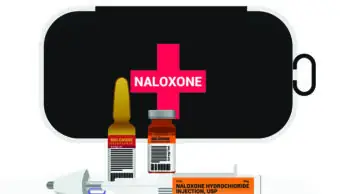
Shutterstock.com
Recruitment for the largest ever clinical trial using ketamine-assisted therapy in people with severe alcohol use disorder (AUD) has begun.
In an announcement published on 12 August 2024, the National Institute for Health and Care Research said the ‘Multicentre Investigation of Ketamine for Reduction of Alcohol Relapse’ (MORE-KARE) trial will initially be delivered at eight NHS sites across the UK. Exeter and Oxford sites are currently accepting people onto the trial, and further sites to be opening soon include two sites in London, Manchester, Plymouth, Surrey and Sussex.
The phase III randomised clinical trial of 280 adults will explore the combination use of psychological therapy and varying dose of low-dose ketamine infusion as a possible treatment for AUD.
Ketamine is a rapid-acting general anaesthetic used for the induction and maintenance of anaesthesia. It is also used to treat depression and in pain management. It has also been reported as a drug of abuse and is associated with illegal, recreational use.
Study participants will be randomised to ketamine (0.8 mg/kg) and psychological therapy (n=140); or a sub-therapeutic very low dose of ketamine (0.05mg/kg) and alcohol education (n=140) groups, for a treatment duration of 4 to 12 weeks.
Participants will be monitored on the number of days of heavy alcohol drinking through a drink diary, self-breathalysing, as well as alcohol glucuronide urine dipstick testing at trial visits. Follow-up will be scheduled at 6 and 12 months from randomisation.
Researchers will also examine the impact on the number of participants with no heavy drinking days; treatment responders, defined as a change of two levels on the World Health Organization alcohol risk score; depressive symptoms; and social and role functioning.
In January 2022, results from an earlier phase II clinical trial revealed that combined ketamine and therapy resulted in increased abstinence from around 2% prior to the trial to 86% post-trial, over a six-month period.
Amira Guirguis, chair of the Royal Pharmaceutical Society’s science and research committee and an expert in novel psychoactive substances, commented: “The MORE-KARE phase III trial represents an important step forward in exploring ketamine-assisted therapy as a treatment for AUD.
“The positive findings from the phase II trial, where participants showed a significant reduction in drinking behaviour, are promising and suggest that this approach has the potential to address a critical gap in the management of alcohol relapse.
“Currently, effective treatments for AUD are limited, and many patients struggle with relapse despite existing therapies,” she explained.
“Safety remains a central concern. While the phase II results indicated benefit, the phase III trial will need to rigorously assess whether these benefits outweigh the risks, particularly in patients with existing vulnerabilities due to chronic alcohol use.
“Additionally, the long-term impact of repeated ketamine use, particularly in this population, is not fully understood,” added Guirguis.
In the UK, more than 500,000 adults have problems with alcohol and alcohol-related harm is estimated to cost the NHS around £3.5b each year.
According to latest official statistics in England, there were 7,912 alcohol-specific deaths in 2022, a 4.7% increase from 2021 and a 56.7% increase from 2006.
Treatment success rates are generally very low for alcohol use disorders, with more than 70% of patients undergoing treatment estimated to return to harmful drinking within 12 months of treatment.
Commenting on the trial, Richard Piper, chief executive of Alcohol Change UK, said: “We support continued research into alcohol treatment and this work holds some promise.
“Yet, as a society we need a stronger focus on preventing all types of alcohol harm in the first place.”
- The headline of this article was amended on 20 August 2024 to clarify that the trial has not yet launched across all eight NHS sites


